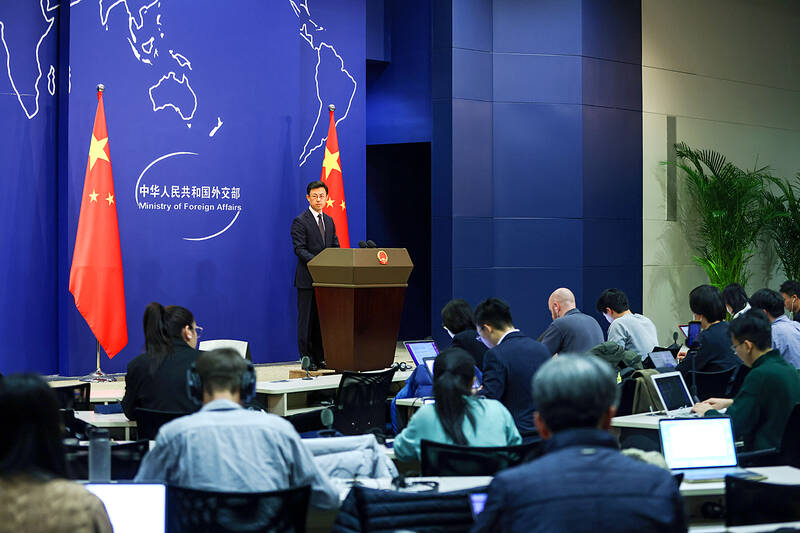US President Donald Trump on Thursday said that he wanted to restart nuclear arms control talks with Russia and China, and that eventually he hoped all three countries could agree to cut their massive defense budgets in half.
Speaking to reporters in the Oval Office in Washington, Trump lamented the hundreds of billions of dollars being invested in rebuilding the nation’s nuclear deterrent and said he hoped to gain commitments from the US’ adversaries to cut their own spending.
“There’s no reason for us to be building brand new nuclear weapons, we already have so many,” Trump said. “You could destroy the world 50 times over, 100 times over, and here we are building new nuclear weapons, and they’re building nuclear weapons.”

Photo: EPA-EFE
“We’re all spending a lot of money that we could be spending on other things that are actually, hopefully much more productive,” Trump said.
While the US and Russia hold massive stockpiles of weapons since the Cold War, Trump predicted that China would catch up in its capability to exact nuclear devastation “within five or six years.”
He said if the weapons were ever called to use, “that’s going to be probably oblivion.”
Trump said he would look to engage in nuclear talks with the two countries once “we straighten it all out” in the Middle East and Ukraine.
“One of the first meetings I want to have is with President Xi [Jinping, 習近平) of China, President [Vladimir] Putin of Russia,” Trump said. “And I want to say: ‘Let’s cut our military budget in half.’ And we can do that. And I think we’ll be able to do it.”
Trump in his first term tried and failed to bring China into nuclear arms reduction talks when the US and Russia were negotiating an extension of a pact known as New START.
Russia suspended its participation in the treaty during the administration of former US president Joe Biden, as Washington and Moscow continued on massive programs to extend the lifespans or replace their Cold War-era nuclear arsenals.
China has rebuffed past US efforts to draw it into nuclear arms talks, saying the US and Russia first need to reduce their much larger arsenals.
A government official reiterated that position yesterday.
“The US and Russia should ... significantly and substantially reduce their nuclear arsenals and create the necessary conditions for other nuclear-armed states to join the nuclear disarmament process,” Chinese Ministry of Foreign Affairs spokesman Guo Jiakun (郭嘉昆) said at a daily briefing in Beijing.
It is also far from certain that China or Russia would agree to such cuts given how US defense spending of about US$850 billion dwarfs their annual outlays. China was forecast to spend about US$230 billion on defense last year and is in the middle of a major military expansion. Russia’s defense budget last year has grown significantly since the start of war in Ukraine, but was still about half that.
Guo said “the limited national defense spending of China is what is needed to defend its national sovereignty, security and development interests, and what is needed to safeguard world peace.”
Additional reporting by Bloomberg

The Ministry of the Interior (MOI) is to tighten rules for candidates running for public office, requiring them to declare that they do not hold a Chinese household registration or passport, and that they possess no other foreign citizenship. The requirement was set out in a draft amendment to the Enforcement Rules of the Public Officials Election and Recall Act (公職人員選舉罷免法 ) released by the ministry on Thursday. Under the proposal, candidates would need to make the declaration when submitting their registration forms, which would be published in the official election bulletin. The move follows the removal of several elected officials who were

The Republic of China (ROC) is celebrating its 114th Double Ten National Day today, featuring military parades and a variety of performances and speeches in front of the Presidential Office in Taipei. The Taiwan Taiko Association opened the celebrations with a 100-drummer performance, including young percussionists. As per tradition, an air force Mirage 2000 fighter jet flew over the Presidential Office as a part of the performance. The Honor Guards of the ROC and its marching band also heralded in a military parade. Students from Taichung's Shin Min High School then followed with a colorful performance using floral imagery to represent Taiwan's alternate name

FOUR DESIGNATED AREAS: Notices were issued for live-fire exercises in waters south and northwest of Penghu, northeast of Keelung and west of Kaohsiung, they said The military is planning three major annual exercises across the army, navy and air force this month, with the navy’s “Hai Chiang” (海強, “Sea Strong”) drills running from today through Thursday, the Ministry of National Defense said yesterday. The Hai Chiang exercise, which is to take place in waters surrounding Taiwan, would feature P-3C Orion maritime patrol aircraft and S-70C anti-submarine helicopters, the ministry said, adding that the drills aim to bolster the nation’s offshore defensive capabilities. China has intensified military and psychological pressure against Taiwan, repeatedly sending warplanes and vessels into areas near the nation’s air defense identification zone and across

A Chinese takeover of Taiwan would severely threaten the national security of the US, Japan, the Philippines and other nations, while global economic losses could reach US$10 trillion, National Security Council Deputy Secretary-General Lin Fei-fan (林飛帆) wrote in an article published yesterday in Foreign Affairs. “The future of Taiwan is not merely a regional concern; it is a test of whether the international order can withstand the pressure of authoritarian expansionism,” Lin wrote in the article titled “Taiwan’s Plan for Peace Through Strength — How Investments in Resilience Can Deter Beijing.” Chinese President Xi Jinping’s (習近平) intent to take Taiwan by force